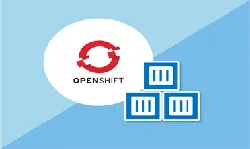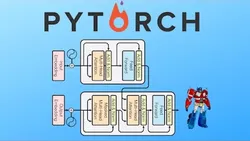
Guided Project: Get Started with Red Hat OpenShift 
Red Hat OpenShift is a popular open-source system for containerized workloads, based on Kubernetes. It enables companies to automate the deployment, management and scaling of container-based applications, providing a powerful platform for businesses to build and manage their applications. ▼
ADVERTISEMENT
Course Feature
![]() Cost:
Cost:
Free
![]() Provider:
Provider:
Edx
![]() Certificate:
Certificate:
Paid Certification
![]() Language:
Language:
English
![]() Start Date:
Start Date:
Self paced
Course Overview
❗The content presented here is sourced directly from Edx platform. For comprehensive course details, including enrollment information, simply click on the 'Go to class' link on our website.
Updated in [February 21st, 2023]
[Course Overview]
This hour-long guided project provides an introduction to Red Hat OpenShift and Kubernetes. Learners will gain practical experience with OpenShift and learn how to use the oc command line, OpenShift’s command line interface (CLI), and the OpenShift web console. Learners will build a container image, push the image to a registry, create a deployment that references that image, and expose the application to the Internet with a hostname. The project is designed to be completed in a Cloud-based IDE from IBM Skills Network that already has many technologies, including Kubernetes and OpenShift, preinstalled.
[Why to Learn]
Kubernetes and OpenShift skills are highly sought after in the industry. This project provides an introduction to Red Hat OpenShift and Kubernetes, and gives learners the opportunity to gain practical experience with OpenShift. Learners will learn how to use the oc command line, OpenShift’s command line interface (CLI), and the OpenShift web console. They will also build a container image, push the image to a registry, create a deployment that references that image, and expose the application to the Internet with a hostname.
[Development Paths]
This project is a great starting point for learners who are interested in learning more about Kubernetes and OpenShift. After completing this project, learners can continue to develop their skills by taking more advanced courses on Kubernetes and OpenShift. They can also explore other related topics such as container orchestration, CI/CD, and cloud-native application development.
[Related Learning Suggestions]
Learners who are interested in learning more about Kubernetes and OpenShift can explore the following courses:
• Kubernetes Fundamentals
• OpenShift Administration
• OpenShift Development
• Cloud-Native Application Development
• Container Orchestration
• CI/CD with Kubernetes and OpenShift.
[Applications]
Those who have completed this course can apply their knowledge of OpenShift by creating and managing containerized applications. They can use the oc command line and OpenShift web console to build container images, push them to a registry, create deployments, and expose applications to the Internet. Additionally, they can use their knowledge of Kubernetes and OpenShift to help companies automate deployment, management, and scaling of container-based applications.
[Career Paths]
1. Kubernetes Engineer: Kubernetes Engineers are responsible for designing, deploying, and managing Kubernetes clusters. They must have a deep understanding of the Kubernetes architecture and be able to troubleshoot and optimize clusters. As Kubernetes continues to gain popularity, the demand for Kubernetes Engineers is expected to grow.
2. OpenShift Administrator: OpenShift Administrators are responsible for managing and maintaining OpenShift clusters. They must have a deep understanding of the OpenShift architecture and be able to troubleshoot and optimize clusters. As OpenShift continues to gain popularity, the demand for OpenShift Administrators is expected to grow.
3. Cloud Native Developer: Cloud Native Developers are responsible for developing applications that are designed to run on cloud-native platforms such as Kubernetes and OpenShift. They must have a deep understanding of the cloud-native architecture and be able to troubleshoot and optimize applications. As cloud-native technologies continue to gain popularity, the demand for Cloud Native Developers is expected to grow.
4. DevOps Engineer: DevOps Engineers are responsible for automating the deployment, management, and scaling of applications. They must have a deep understanding of DevOps tools and processes and be able to troubleshoot and optimize applications. As DevOps continues to gain popularity, the demand for DevOps Engineers is expected to grow.
[Education Paths]
1. Bachelor's Degree in Computer Science: A Bachelor's Degree in Computer Science is a great way to gain the skills and knowledge needed to work with Kubernetes and OpenShift. This degree will provide students with a comprehensive understanding of computer science fundamentals, such as algorithms, data structures, and software engineering. Additionally, students will learn about the latest technologies and trends in the field, such as cloud computing, artificial intelligence, and machine learning.
2. Master's Degree in Cloud Computing: A Master's Degree in Cloud Computing is a great way to gain the skills and knowledge needed to work with Kubernetes and OpenShift. This degree will provide students with a comprehensive understanding of cloud computing fundamentals, such as distributed systems, virtualization, and cloud security. Additionally, students will learn about the latest technologies and trends in the field, such as containerization, serverless computing, and DevOps.
3. Certificate in Kubernetes and OpenShift: A Certificate in Kubernetes and OpenShift is a great way to gain the skills and knowledge needed to work with these technologies. This certificate will provide students with a comprehensive understanding of Kubernetes and OpenShift fundamentals, such as container orchestration, deployment strategies, and security. Additionally, students will learn about the latest technologies and trends in the field, such as serverless computing, CI/CD pipelines, and cloud-native applications.
4. Professional Certificate in Cloud Computing: A Professional Certificate in Cloud Computing is a great way to gain the skills and knowledge needed to work with Kubernetes and OpenShift. This certificate will provide students with a comprehensive understanding of cloud computing fundamentals, such as distributed systems, virtualization, and cloud security. Additionally, students will learn about the latest technologies and trends in the field, such as containerization, serverless computing, and DevOps.
Course Provider

Provider Edx's Stats at AZClass
Discussion and Reviews
0.0 (Based on 0 reviews)
Explore Similar Online Courses

Free Bachata Mini Course - Introduction To Bachata Dancing

Pytorch Transformers from Scratch (Attention is all you need)

Python for Informatics: Exploring Information

Social Network Analysis

Introduction to Systematic Review and Meta-Analysis

The Analytics Edge

DCO042 - Python For Informatics

Causal Diagrams: Draw Your Assumptions Before Your Conclusions

Whole genome sequencing of bacterial genomes - tools and applications

Kubernetes for Beginners (Kubernetes + Docker)

Scalable Microservices with Kubernetes


Start your review of Guided Project: Get Started with Red Hat OpenShift